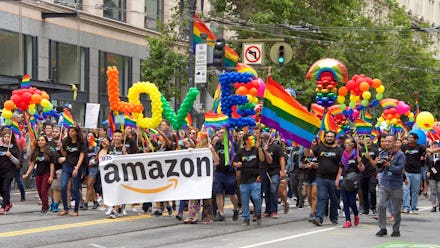Nearly half of LGBTQ employees are not out at work. One out leader hopes to change that from within.

A report this week by the Human Rights Campaign found 46 percent of LGBTQ individuals are not out at work, and 53 percent have heard jokes about lesbian or gay people in their workplaces. The survey also found that LGBTQ individuals often believe nothing will result from reporting homophobic remarks, and doing so will invariably affect their relationships with colleagues.
“In subtle or overt ways, LGBTQ workers are getting the messages that they are unwelcome,” Deena Fidas, director of the Workplace Equality Program at the HRC, said in a phone interview. “And that’s not necessarily something you can legislate.”
The consequences of unwelcome working environments are clear — more than 30% of LGBTQ individuals surveyed reported feeling depressed or unhappy at work. “People are feeling anxious, depressed, distracted from work, avoiding certain colleagues and feeling exhausted from having to spend energy or time hiding who they are,” said Fidas. “But on the flip side, when they feel welcome for who they are, they decide to stay there.”
In recent years, companies like Amazon, Google, American Express and Bank of America have devoted resources to inclusivity and instituted unconscious bias training workshops to help eliminate gender, racial and LGBTQ discrimination. But unconscious bias training has its limits, particularly when it comes to mitigating long-established, internalized biases. So what actually works?
One leader, who is out as gay, hopes to supplement such initiatives with a larger network of allies. “It’s important to know that’s what our mind does — that we all have mental shortcuts, that we rely on stereotypes — but that alone is insufficient,” said Scott Beth, a VP of finance and operations at Intuit. “What we found is that unconscious bias training, by itself, helps you see biases in others, but is too hard to correct in oneself.”
In an effort to create a safe space within the company, Beth instituted an “allyship” program for the more than 8,500 employees at Intuit — the company behind TurboTax, Mint and QuickBooks. Beth hopes the program allows for more open dialogue between straight and gay colleagues and helps employees feel comfortable about discussing their sexuality. “We ask [our allies] to learn and educate themselves on LGBTQ issues, and we ask them to take action,” he said. “If they see or hear discriminatory remarks, they should say something and stick up for their LGBTQ colleagues.”
31 states still lack employment protections for LGBTQ communities.
Training sessions include discussions about gay rights and terms like cisgender, transgender, sex and orientation. According to Fidas of the HRC, 31 states still lack employment protections for LGBTQ communities. Through this program, Beth hopes to openly acknowledge that there’s still progress to be made. “If I’m a lesbian who takes my partner to a Christmas party and I’m in Texas, [I could lose my] job the next day. Our nondiscrimination and inclusion policy covers our Intuit employees but doesn’t cover our family members. The right of earning a paycheck has not kept pace.”
Gay-straight alliances aren’t new — over the past decade, over 1,000 gay-straight alliances are estimated to have formed in public and private high schools and middle schools across the country, and many companies have instituted ally groups similar to Intuit’s. Still, a disproportionate amount of LGBTQ employees feel undermined.
Since its inception last week, Intuit’s allyship program has grown to over 400 members. While it’s still a new initiative, Beth said having out colleagues is key, and in the absence of queer leaders, sometimes visibility is the first step. “I encourage other gay executives to be out from that start. I’m out. I’m leading with authenticity, and I expect everyone to be themselves,” he said. “When there is a value system and deep mutual respect, that’s when you can bring your full self to work.”